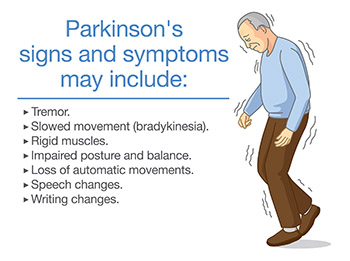
Parkinson’s disease symptoms seen in Birmingham retirement communities.
It’s not uncommon to find someone in Birmingham retirement communities who suffers from Parkinson’s Disease, a long-term degenerative disorder of the central nervous system that mainly affects our motor functions.
The list of people who’ve had or have Parkinson’s disease includes Boxer Muhammad Ali, former President H.W. Bush, Artist Salvador Dali, Singer Neil Diamond, Actor James Doohan, Actor Michael J. Fox, the Reverend Jesse Jackson, the recently deceased Reverend Billy Graham.
If those names do not create a picture, it’s not hard to recognize someone with the condition: Their hands likely shake, they move very slowly, have difficulty walking, and their body is rigid.
Parkinson’s can be confused with Multiple Sclerosis (MS) because both conditions cause hands to shake and affect the central nervous system that controls how a person moves, sleeps, feels, and talks. Both affect nerves, although in different ways. Also, both Parkinson’s and MS begin with mild symptoms that progressively get worse over time. Depression, spastic limb movements, poor balance, and loss of bladder or bowel control can occur in both conditions.
Where they differ: causation and the age when symptoms usually first appear.
The body’s immune system gets credit for Multiple Sclerosis by attacking and destroying a coating on nerves. With Parkinson’s, brain cells start dying off, producing less of the chemical dopamine that helps control body movement. MS usually starts in people ages 20 or older, although children get it, too. Parkinson’s usually starts around age 60 or older, although Michael J. Fox illustrates an instance of someone suffering from Parkinson’s earlier in life. Genes, as well as exposure to toxic chemicals like pesticides or weed killers, constitute risk factors.
How does one know whether it’s MS or Parkinson’s? Symptoms of Parkinson’s usually not seen with MS include poor posture, loss of control over blinking, loss of control when swinging arms while walking, and small, cramped handwriting. Some people suffer from both MS and Parkinson’s; research suggests the damage caused by MS leads some to develop Parkinson’s later in life.
At Regency and other assisted living communities, support personnel help to preserve independence for those enduring such unfortunate diseases. Unlike a private home, trained professionals with medical experience stand ready to respond as needed. Medications to treat Parkinson’s may raise dopamine levels or ease Parkinson’s symptoms such as tremors. As a person ages, drug treatments become less effective, which another reason why retirement communities like Regency offer solutions such as rails to reduce the likelihood of falls due to poor balance.
Residents and family gain the peace of mind knowing that compassionate and responsive attention comes with the package.
A move to assisted living may sound scary to most people, but we encourage those considering it to schedule a visit, see the community for themselves, have lunch, and consider the benefits for residents and their family caregivers impacted by such a decision. To learn more about Regency, call us at (205) 942-3355.
Copyright: logo3in1 / 123RF Stock Photo
